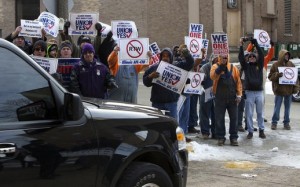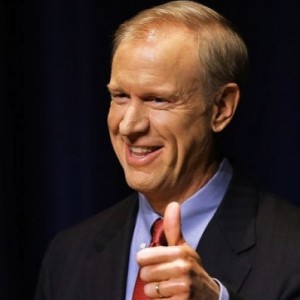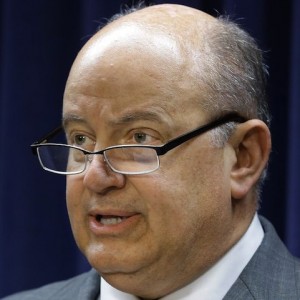
– Hugh Sullivan/AP photo
No free ride, unions say
By CARL GREEN
Illinois Correspondent
Belleville – Illinois labor unions gave their answer to Gov. Bruce Rauner about fair share payments last week – there’s no such thing as a free ride.
In a show of solidarity, the Illinois AFL-CIO, AFSCME and 25 other unions, representing more than 400,000 state employees, filed suit against Rauner’s order to block fair share fees from being collected by unions representing state employees.
The suit was filed March 5 in St. Clair County Circuit Court.
According to the lawsuit, Rauner’s executive order blocking the payments not only violates collective bargaining agreements, but state law, too.
Fair share agreements were approved in the 1983 Illinois Public Labor Relations Act, signed by Gov. Jim Thompson, a Republican. The lawsuit says Rauner’s order violates the separation of powers in state government by seeking to cancel that law.

The lawsuit states: “Rauner has usurped the constitutional power of the legislative branch in promulgating an executive order that effectively repeals a duly passed public act and has unlawfully exercised the veto power vested in the governor.
“The executive power is the power to faithfully execute the laws enacted through the legislative process, not to refuse to implement the laws that have been properly enacted by the state.”
Unions are required under federal law to represent all workers in a union shop, whether they choose to join the union or not.
Under federal and Illinois state labor law, employees who decline to join a union are required to pay “fair share” fees – which cannot be used for political purposes – to cover the cost to the unions of negotiating higher wages and benefits on their behalf.
The unions and labor groups involved in the lawsuit include:
- AFL-CIO
- AFSCME
- Fraternal Order of Police
- Illinois Nurses Association
- Illinois Federation of Teachers
- Teamsters
- Service Employees International Union (SEIU)
- Laborers
- Police Benevolent and Protective Association
- Bakery Workers
- Bricklayers
- Carpenters
- Electrical Workers
- Operating Engineers
- Food and Commercial Workers
- Machinists
- Painters
- Plumbers
- Metropolitan Alliance of Police
PEOPLE WHO DO THE REAL WORK
Illinois AFL-CIO President Michael Carrigan said: “The men and women who do the real work of state government are first responders, nurses, caregivers and corrections officers. They plow snow, protect children, care for veterans and do many other tough, essential jobs that benefit all Illinois residents.

“Gov. Rauner’s political obsession with stripping their rights and driving down their wages demeans their service, hurts the middle class and is blatantly illegal. We’re asking the court to restore the integrity of our democratic process and make clear that no one, not Gov. Rauner or anyone else, can place themselves above the law.”
Attorney General Lisa Madigan has already given her legal opinion that Rauner’s order is illegal, causing Comptroller Leslie Munger – herself a Rauner appointee – to refuse to enact Rauner’s order that the fare share funds be kept in escrow until the legal issues are decided.
Rauner has ordered the departments he controls to withhold the money anyway.
Rauner has also filed suit in a Chicago federal court to have fair share payments declared unconstitutional.
Last week, the unions group filed a motion to dismiss that case, saying the issue should be decided in state court because it is a matter of state law.
SUPREME COURT THREAT
If Rauner’s suit moves to the U.S. Supreme Court, fair share payments could be outlawed nationwide, leaving all workers with less support against attempts to cut their wages and benefits.
Rauner’s position is that while fair share fees are not to be used for political purposes, they can’t be separated from other union revenues.
Last year, the U.S. Supreme Court ruled against fair share fees in a limited ruling that affected Illinois home health care assistants. The vote was along party lines, with the five Republican justices outweighing the four Democrat appointees.
It did not apply to other workers because the health care workers were not considered state employees. But it left observers with the impression that the Supreme Court would outlaw fair share altogether if it had the opportunity, and Rauner’s federal lawsuit could give it that chance.
“If there’s a good solid case, the Supreme Court may decide against labor,” Gary Chaison, a professor of labor relations at Clark University in Massachusetts told the Chicago Tribune. “I think labor’s view is, ‘oppose everything,’ because you can’t win, you can only lose something that you already have.”

